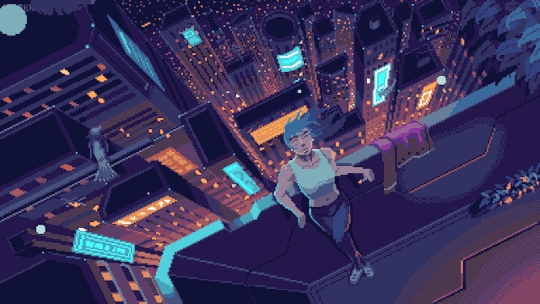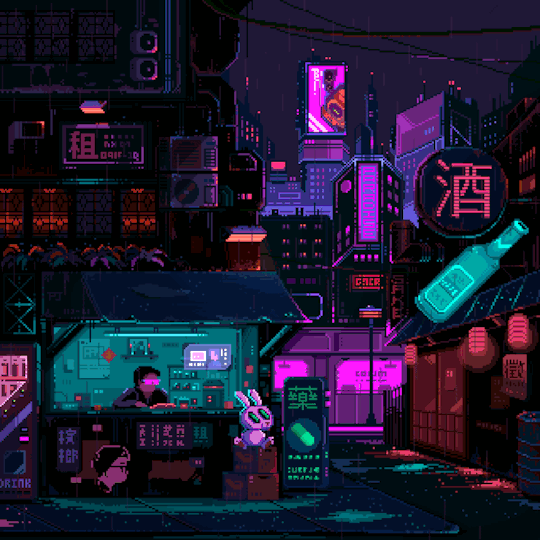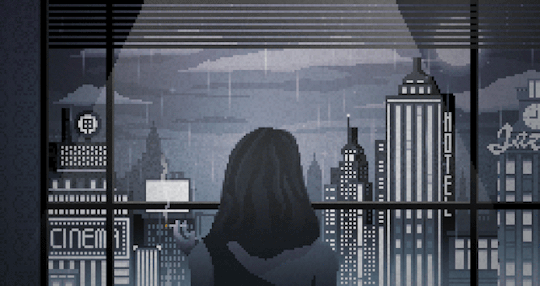#Genre History
Explore tagged Tumblr posts
Text
The History of Cyberpunk
Or why every other SciFi Genre is called [something]punk

You know what? Let's do this. Because I have seen the discussion on whether or not Solarpunk is "punk" over the last few days and... people really gotta learn their history.
The first time a genre took the "punk" name was Cyberpunk. And for context we gotta talk a bit about the history of the Cyberpunk genre.
While some books that we in hindsight call "Cyberpunk" were released as early as the 1960s, the start of Cyberpunk as a genre got its start in the late 70s and early 80s.
The term was invented by Bruce Bethke, who published a short story in 1983 with the name "Cyberpunk". His idea was to juxtapose the term "punk" for both the mentality and the punk protagonists in his short story with the term cyber, short for the cybernetics they were wearing. And while the cybernetics have become a main stay in the genre, the punk attitudes are not always carried through...
Well, the title Bethke invented stuck, though. When 1984 Neuromancer was published, one of the most influencial works in the early days of the genre, he called it "a Cyberpunk novel" in the marketing. And from there... Well, the genre was suddenly named like that.
The 80s were definitely the decade that had the most influence on the genre, given that a lot of the big novels and graphic novels of the genre were released here.
A big influence was, no doubt, that 1982 the Blade Runner movie had released and had inspired quite a few writers and artists. (And yes, this makes Blade Runner a movie that released not only before the term Cyberpunk was coined, but also before the genre had a chance to define itself.)
Given that the genre was defined in the 80s, there are a lot of 80s anxiety kept within it about the rise of the Japanese economy, that are these days rarely questioned within the western Cyberpunk movement.
When the genre was coined and developed, Japan was the fastest growing economy in the world, being so influencial that they got to buy out several things in America. Something that kinda jerked white people in the US a lot. This is, why Cyberpunk originally depicted not only a capitalist hellscape - but specifically a capitalist hellscape were everything was bought out by Japanese companies, with many of those early antagonists being Japanese companies. And yeah... there was a lot of both anti-japanese racism, but also cultural appropriation of Japanese things in early Cyberpunk, at time surviving to this day. (But that is a story for another day.)
The general sense that Western Cyberpunk had, was always the idea of: We have a capitalist hellscape where the world is slowly dying and people are exploited with no end, while we have those kinda punky protagonists, who stand outside of the society and try to work against it. This being where the punk comes from.
Now, I could talk for length about how a lot of that punky attitude has been lost in more modern Cyberpunk media, but that, too, is a story for another day.
So, let me just talk about what happened then.
The term Cyberpunk really is darn catchy, right? So just when that name took hold, writer K.W. Jeter retroactively called his 1979 novel Morlock Night "steampunk". And guess what: This stuck, too. Though while the 80s Cyberpunk still stuck to the punk attitude, a lot of Steampunk did not. While for certain there is quite a bit of Steampunk that has kinda punky characters go against the quasi Victorian society of steampunk books (something most common in the air pirate novels I have read), a lot of other stories are more focused on a general sense of adventure.
But never the less... The genre names stuck and gave a nice baseline for naming other genre. We got Dieselpunk, Atompunk, Nanopunk, Arcanepunk, Dustpunk, Silkpunk and of course also Solarpunk and Lunarpunk.
And for the most part... The "punk" names mostly communicate: "It is SciFi with this kinda aesthetic/twist going on". Which is just how it turned out.
Funnily enough Solarpunk is for once a genre that brings back the punk, as it tends to include a lot of the ideals aspired to by the Punk counter culture of the 1970s: Anarchism, anti-capitalism, anti-consumerism, anti-classism, anti-racism, anti-colonialism and so on. Though other than with Cyberpunk and the real world punk movement, Solarpunk for the most part imagines a place, where those things are culture instead of counter culture.
I personally find it kinda sad, how for the most part Cyberpunk kinda lost a lot of the counter-cultural, revolutionary mindset. And how fucking defeatist the genre often is.
But again, it is a story for another day. Just as the story of Japanese Cyberpunk is.

#cyberpunk#solarpunk#steampunk#cyberpunk history#western cyberpunk#science fiction#scifi#william gibson#neuromancer#genre history#punk
462 notes
·
View notes
Text
15 Years of "Looking Back on Genre History"
I've been contributing my "Looking Back on Genre History" segments to the StarShipSofa podcast for 15 years now. All of my past segments are listed (with their topics and links!) on the "Podcasting" page of my website. (Scroll down to the "Looking Back on Genre History" section.)


#StarShipSofa#Science Fiction#Science Fiction History#Science Fiction Studies#Genre History#Amy H. Sturgis#Podcasting
5 notes
·
View notes
Text
in many ways, then, cosmological horror is everywhere - rather, existential horror, because of the times we live in
(also, because this thread diverged a lot, I need to share this horror fan's rebuttal of OP's commentary)
changes and trends in horror-genre films are linked to the anxieties of the culture in its time and place. Vampires are the manifestation of grappling with sexuality; aliens, of foreign influence. Horror from the Cold War is about apathy and annihilation; classic Japanese horror is characterised by “nature’s revenge”; psychological horror plays with anxieties that absorbed its audience, like pregnancy/abortion, mental illness, femininity. Some horror presses on the bruise of being trapped in a situation with upsetting tasks to complete, especially ones that compromise you as a person - reflecting the horrors and anxieties of capitalism etc etc etc. Cosmic horror is slightly out of fashion because our culture is more comfortable with, even wistful for, “the unknown.” Monster horror now has to be aware of itself, as a contingent of people now live in the freedom and comfort of saying “I would willingly, gladly, even preferentially fuck that monster.” But I don’t know much about films or genres: that ground has been covered by cleverer people.
I don’t actually like horror or movies. What interests me at the moment is how horror of the 2020s has an element of perception and paying attention.
Multiple movies in one year discussed monsters that killed you if you perceived them. There are monsters you can’t look at; monsters that kill you instantly if you get their attention. Monsters where you have to be silent, look down, hold still: pray that they pass over you. M Zombies have changed from a hand-waved virus that covers extras in splashy gore, to insidious spores. A disaster film is called Don’t Look Up, a horror film is called Nope. Even trashy nun horror sets up strange premises of keeping your eyes fixed on something as the devil GETS you.
No idea if this is anything. (I haven’t seen any of these things because, unfortunately, I hate them.) Someone who understands better than me could say something clever here, and I hope they do.
But the thing I’m thinking about is what this will look like to the future, as the Victorian sex vampires and Cold War anxieties look to us. I think they’ll have a little sympathy, but they probably won’t. You poor little prey animals, the kids will say, you were awfully afraid of facing up to things, weren’t you?
34K notes
·
View notes
Text
"But no magazine is perhaps better representative of the explosion of pulp genre fiction that swept through the early twentieth century and eventually gave birth to the juggernauts of Marvel and DC."
0 notes
Text

Spirit, George Roux (1885)
#vintage#art#painting#old paintings#fine art#mystical#art history#history#vintage art#artist#artwork#1800s art#1800s#canvas#culture#old art#classical art#vintage aesthetic#artblr#museum#history aesthetic#oil on canvas#oil painting#genre painting#genre art#french art#ghost
9K notes
·
View notes
Text

The Death of Cleopatra, 1890
John Collier
5K notes
·
View notes
Text

Women Watching Stars, Ōta Chōu, 1936
#art#art history#Ōta Chōu#Asian art#Japanese art#East Asian art#genre art#astronomy#color on paper#Showa period#Showa era#20th century art#National Museum of Modern Art Tokyo
8K notes
·
View notes
Text


Jacques-Laurent Agasse (Swiss, 1767–1849), "The Hard Word"
#Jacques-Laurent Agasse#art#swiss art#painting#genre painting#animal painting#animals in art#animals#cat#cats#cat painting#cats in art#oil on canvas#oil painting#19th century art#19th century#art detail#art history#aesthetic#paintings
2K notes
·
View notes
Note
I maybe it's I'm going insane do to to recent events but i have become completely disillusioned about the cyberpunk movement being truly "punk", given it ended up giving us moldbug, nick land, Elon Musk and the modern culture of silicon valley. I could be wrong though. i just can't help but think overwise.
Cyberpunk was never a social movement; anyone who tries to tell you otherwise is selling something. There's an argument to be made that it was, at one time, a legitimate artistic and literary counterculture, but if so, it's one that had largely exhausted its cultural relevance by the early 1990s, and it's been running on pure vibes ever since. This isn't to say that there haven't been individual works in the last thirty years of cyberpunk media that are worth examining, of course, but as a genre? It's not accidental that contemporary cyberpunk has mutated into an exercise in 1980s retrofuturism – that's about the last time cyberpunk literature as a whole had anything interesting to say.
2K notes
·
View notes
Text

‘The Quiet Pet’ (detail) by John William Godward, c. 1906.
#john william godward#vintage art#classic art#art#painting#art history#old art#art details#vintage#oil painting#animal art#genre art#neoclassicism
11K notes
·
View notes
Text

The Artist's Garden at Vétheuil (1880) by Claude Monet
#art#art history#artwork#painting#history#museums#culture#vintage#curators#museum#claude monet#impressionism#genre painting
641 notes
·
View notes
Text
The Hopelessness of Cyberpunk

So, let me talk about the thing that made me fall out of love with the Cyberpunk genre - or rather that made my relationship with the genre rather complicated. And that is just... how fucking hopeless and, excuse my 2000s slang, edgy.
Don't get me wrong. Cyberpunk was always kinda edgy. That was kinda one of the point of the genre. There always has been this thing about the main characters often being anti-heroes who are just done with the world. In most of the times we have this leather duster gruff white male protagonists, who have found at least one woman associated with them in a refrigerator of some sort... You get what I am saying, right?
And yes, there always were those stories that came out on the end of "rebellion is useless" in Cyberpunk. But in those early days it was usually in a way that the protagonists were at least given their small victories.
To me it feels as if it has only gotten worse since, though. In modern Cyberpunk it seems all just super hopeless and then some people will go there and be like: "Oh yeah, that is realism! Dark and gritty, just like the real world." To which... First: "No. They only want you to think that." But second: "That's not what media is for!"
I really have to say, that I have trouble to understand why people find stories appealing that tell you: "You see how those people are exploited? Yeah? Well, guess what, them trying to do something against it is hopeless. So do not get any ideas, yeah?"
And of course there is the other thing with Cyberpunk, too. A lot of Cyberpunk has just lost the entire punk stuff, outside from the aesthetic. Cyberpunk was original about fighting against the entire system - even if it failed. But a lot of modern Cyberpunk does not do that anymore.
And... It is just frustrating.
Just allow the characters to be punk. Allow characters to try and fight the system. And allow them at least their own little victories, even if they do not save the world.

49 notes
·
View notes
Text

-In a French Garden-
#art#art history#artwork#culture#history#museums#painting#vintage#childe hassam#curators#impressionism#genre painting
452 notes
·
View notes
Text
I am looking forward to this online event at 6pm Eastern on March 14, 2023!
From Pulp Era pioneers to the radical innovators of the 1960s and ’70s, visionary women writers have been a transformative force in American science fiction. For Women’s History Month, acclaimed SF authors Chelsea Quinn Yarbro, Pamela Sargent, and Sheree Renée Thomas join Lisa Yaszek, editor of LOA’s The Future Is Female!, for a conversation about the writers who smashed the genre’s gender barrier to create worlds and works that remain revolutionary.
1 note
·
View note
Text

The Last Drop (1629) by Judith Leyster
436 notes
·
View notes
Text

The Village Peddler (1875) by Louis Comfort Tiffany
#art#art history#painting#artwork#museum#museums#history#culture#vintage#post impressionism#genre painting
491 notes
·
View notes